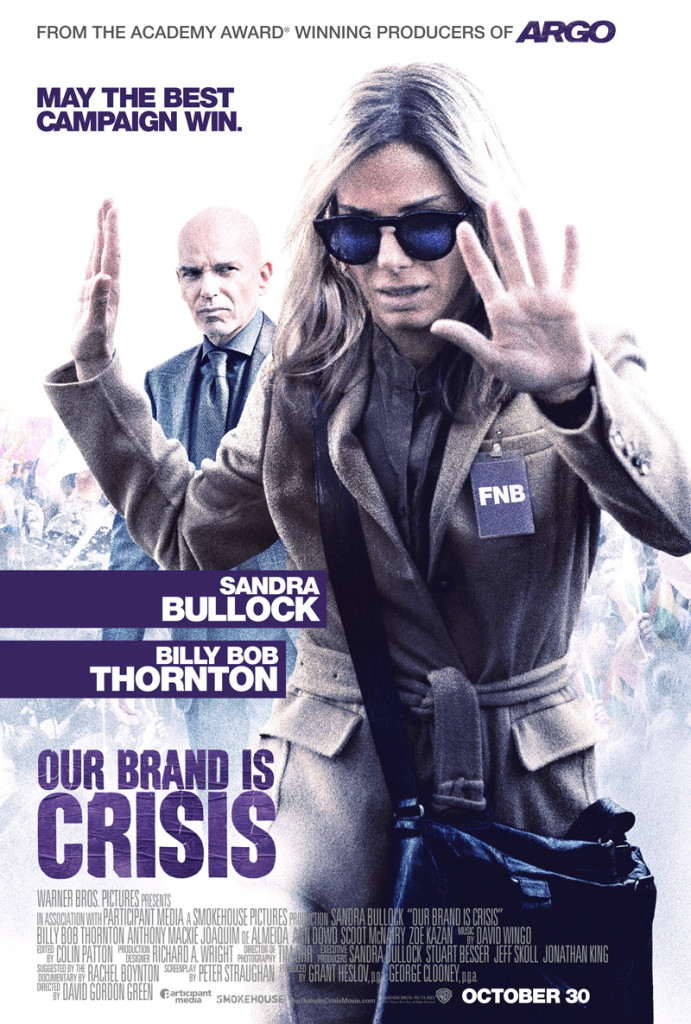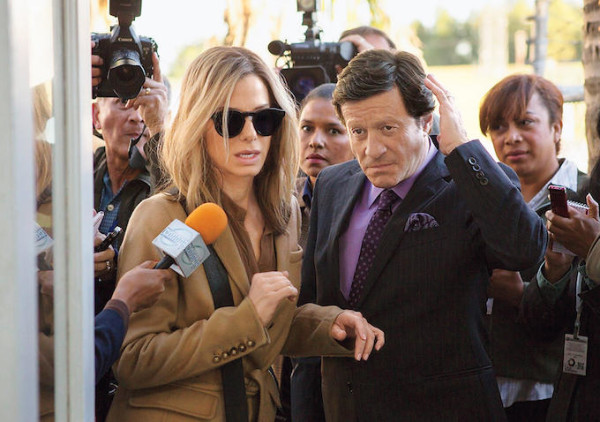Genre: Drama/Satire/Comedy?
Premise: A washed up political strategist becomes the campaign manager for a soulless presidential candidate in Bolivia.
About: “Our Brand is Crisis” is Sandra Bullock’s attempt to add another Oscar to her mantel. The script is based on a documentary that chronicled a Bolivian election, although I don’t know how close to real life they’re playing it since our main character in the documentary as well as in this draft of the script, Bill Bodine, has been changed to a woman (now being played by Sandra Bullock). The project has some major firepower behind it. The producers of Argo. And Bullock’s bestie, George Clooney, is pitching in with his partner, Grant Heslov, to help produce. The script made the 2008 Black List with 22 mentions, somehow beating out Inglorious Basterds (I’d like to see the voting behind that political process). Writer Peter Straughan is highly regarded amongst actors. He got Clooney to star in The Men Who Stare at Goats, Michael Fassbender to star in Frank, Gary Oldman to star in Tinker Tailor Soldier Spy, and now Bullock to star in this.
Writer: Peter Straughan
Details: 126 pages (this is the draft that made the Black List in 2008)
Despite a ton of strong buzz and making the Black List, I’ve avoided “Our Brand is Crisis” like Bolivian street meat. For those not aware, screenplays lose 60% of their entertainment value the second you write “Bolivia” into the margins.
The only redeeming factor here is that they somehow got Sandra Bullock to sacrifice her self-respect and commit to this role. I LOVE me some Sandra Bullock. She’s one of the only movie stars on the planet who embraces her flaws, which is the secret to her longevity.
But that actually makes me question this movie even more. If they had to change the sex of the main character so they could cast one of the most likable actresses on the planet, what does that say about their confidence in the material?
“Crisis” introduces us to Pedro Gallo, the president of Bolivia, as he prepares for his re-election. Despite being the incumbent, Gallo is a million points behind his opponent because he’s a ruthless dictator who has a few rough spots on his resume – such as the time he murdered a bunch of his people.
In comes Bill Bodine to save the day (this is Sandra Bullock’s character before the gender-change rewrite). Bodine was a once kind-of successful campaign manager until his nemesis, Pat Candy, destroyed him in a small-town Texas mayoral campaign. Since then he’s been drifting through life.
Why he’s even in Bolivia to run Gallo’s campaign, then, is one of the many mysteries of the script. He doesn’t want to be there. He doesn’t appear to need the job. His team members are smarter and seem to care more about winning than him. Uh, why is this guy in our movie again?
Eventually, Bodine decides to give a shit about the campaign (nothing brings this on – he just feels like it one day), and is spurred on when he finds out that good old Pat Candy is advising Gallo’s opposition. Finally, a chance to defeat the man who ruined his life!
Bodine opines that the only time people vote bad leaders into office is when the country is going through a crisis. Since their client is a horrible person, all they need to do is find a crisis to put the country in, then everyone will vote Gallo president.
Sticking with the theme of bad storytelling and lack of clarity, it’s never made clear what the actual crisis they come up with is. But why explain a component so critical to the story that it’s in the title when you can instead drag us through one of the most rudimentary political campaigns in history? I’ll let you answer that.
Have you ever been on a date where you order coke and your date orders coffee? Where you order steak and your date orders salad? Where you wanna talk about music but your date wants to talk politics? Where every time you laugh, your date is stone-faced, and vice-versa? Where you and your date seem to be diametrically opposed to every single topic of conversation on the face of the planet?
That’s how I feel when I read Peter Straughan. I didn’t know Straughan had written this but had I, I never would’ve opened it. I just don’t see eye-to-eye with this man. The Men Who Stare at Goats is one of the worst scripts I’ve ever read. And “Frank” represents everything wrong with indie movies (all quirk and zero bite). Even Straughan’s best offering, Tinker Tailor Soldier Spy, I found both boring and tedious.
So it should be no surprise that I absolutely despised this. And look, I’m well aware of the fact that when you’re not into something, you pick it apart. So you’ll have to take this review with a grain of salt. But, I mean, come on. The guy practically handed me the shaker.
Let’s start with Bill Bodine. We spend the first 25 pages watching this guy stare at walls and ceilings. Why? WE HAVE NO IDEA. Pages and pages go by where Bill refuses to come out of his hotel room. And there’s no indication as to what’s causing this. Not even a hint!
It’s not only boring, but FRUSTRATING! As a reader, when a character is acting in any sort of extreme manner, you’d like to have an idea of why. Or else the character becomes a big ball of confusion. Sure, there are times where you want to keep some information (the character’s backstory) from the reader. But we go 60 pages before we learn anything about why this dude is acting like such a putz. I was pulling my hair out.
And because of this, I grew to hate Bill Bodine. I mean, when have you ever liked a character who mopes around, feels sorry for himself, is inactive, and is pathetic? Nobody likes that person. Ever. So even when Bodine started acting like a normal person (70 pages into the script), I’d already formed my opinion. He hadn’t given me a single reason to root for him (it’s making more and more sense why they cast Sandra Bullock).
When we finally do learn what drove Bodine crazy (losing to his rival, Pat Candy, in a tiny mayoral election in Texas 15 years ago), we’re again stuck throwing our hands in the air. THIS IS HIS BIG SECRET??? He lost an election as a young campaign manager in a tiny Texas town forever ago???? I’m sorry but this makes the character even MORE pathetic.
Then there’s Pat Candy, Bodine’s “rival.” Candy is supposed to represent success, the “winner” who’s gone on to become everything Bill Bodine hasn’t. Well pardon me for asking, but if that’s the case, WHAT THE HELL IS HE DOING SLUMMING IT UP AS A CAMPAIGN MANAGER IN BOLIVIA??? He obviously can’t be that successful. Which was just one of many WTF moments I had reading this.
As if that wasn’t perplexing enough, the election storyline devolves into the cliché, “Do we run a negative campaign or not” debate. I mean, the one unique thing you have going for you with this idea is that it’s set in a third-world nation. This gives you the opportunity to explore aspects of a campaign that you’d never be able to if this were set in America.
Instead, we get “Should we go negative with the ads?” which is a trope we’ve seen used in every single one of these movies ever. If you’re not going to exploit the most unique aspect of your premise, why not just move the election to America where the story will be more relatable and draw a bigger audience?
I mean you’re representing a man who has murdered his own people. This is supposed to be a comedy (I think). So why not have fun with that? Why not show them trying to spin that? Yet that’s another problem with this script. It kind of wants to be a comedy but it’s afraid to commit. And you can see this in the trailer. It wants to be taken seriously enough to be called a “satire.” But it still wants those goofy Sandra Bullock moments (or scenes where llamas blow up). It can’t make up its mind.
And I will tell you this right now. If a script is ever unsure of what it wants to be, it’s a dead script. Because, as the writer, you’ll be dancing around the entire screenplay, trying to walk that line, and it ALWAYS shows up in the finished product. The readers and the audience always pick up on it.
I’m going to turn to you guys now. Does this movie appeal to you at all? If so, why? What is it that I’m missing? Because all I see is…
a) Extremely boring subject matter (politics).
b) A film set in the most boring country I can think of.
c) A film unsure of its own tone.
d) A lack of a hook.
e) A script afraid to exploit its concept.
If this movie has a chance, it’s Sandra Bullock. That’s it. Her face and the trust her audience has in her that she won’t lead them down a rotten path. But I don’t think even she can save this. I wish I could latch onto something here to finish on a positive note but I’m struggling, guys. Maybe the documentary was good? Go check that out? But do me a favor and don’t tell me about it. I’d like this review to be the last time I ever hear about Our Brand is Crisis.
[x] what the hell did I just read?
[ ] wasn’t for me
[ ] worth the read
[ ] impressive
[ ] genius
What I learned: I think it’s okay to keep the backstory for your SECONDARY CHARACTERS a secret for an extended period of time (Abraham from the great script, The Brigands of Rattleborge, comes to mind). But I don’t think you can do that with your main character. There are a few exceptions, of course. But, generally speaking, the audience wants to know their hero. The hero is the one taking them on this journey. So if they’re a bottomless pit of mystery boxes for 60 pages, the audience is going to get frustrated and turn on them. That’s what happened to me here with Bill Bodine. I wanted to know why the hell this guy was acting so bizarre, but it took Straughan forever to tell me. I lost interest in the meantime.



